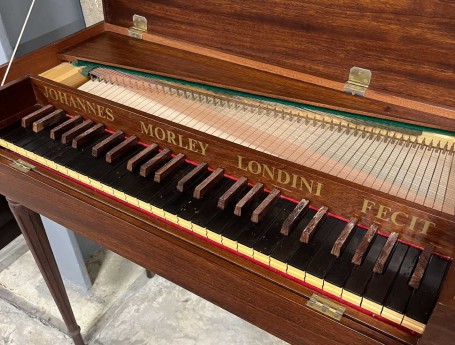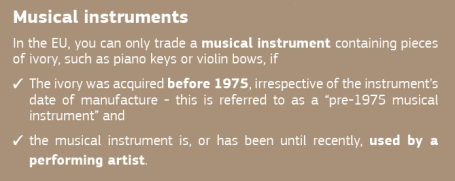
The Ivory Page
Please note that these notes are for information and guidance only. I have done my best to be accurate, but I cannot accept responsibilty: I am not qualified to give official advice.
UK Ivory Sales Act and Article 10
Boring! I'm sorry, but this does affect us all - especially those of us in the UK - and I hope we all wish to obey the law. We all know that under the UK Ivory Sales Act 2018, the sale of ivory and items containing ivory is generally now illegal, and the penalties are quite severe.
Fortunately, as a result of careful submissions by a few of us to the Consultation which preceded the Act, we were able to obtain exemption for musical instruments made before 1975, and containing less than 20% ivory. These instruments must be registered for exemption - details below. In addition, for instruments made from 1947 to 1974, I have recently received confirmation from APHA that the pre-existing legal requirement for a CITES Article 10 permit remains in place. The current cost of an Article 10 certificate is £31, and unlike the Ivory Sales Act exemption, the grant does take a few days after application.
Many of the 'early' keyboard instruments made in this period do have ivory keytops, especially for the sharps. In particular, this was the standard practice for Morley's instruments until the mid 1980s. So, with very few exceptions Morley instruments made before 1975 need both certificates if they are to be offered for sale. We should remember that purchase of an unregistered instrument is separately an offence, so buyers need to reassure themselves.
We should also bear in mind that many instruments made after 1974, including Morleys numbered from about 2400 up to something over 3000, may not be sold or purchased at all, unless the ivory is removed. The instrument in the picture, a clavichord c. 1984, was recently sold at Piano Auctions Ltd, with the ivory duly removed. Perhaps a bit sad, but necessary.
*****************************
UK Ivory Sales Act - Now Being Enforced
The law states:
"From 6th June 2022 you will not able to deal in items containing or made from elephant ivory under the Ivory Act 2018 as exempt or certified exempt."
The full document may be seen by clicking on the picture of the elephant
above. Readers of this site will know well that due to our friends' efforts, musical instruments made before 1975 and containing less than 20% ivory are eligible for registration to enable them to be sold legally The link to the registration process is below:
https://apply-deal-ivory.service.gov.uk/
The fee is £20.
A recent conversation with APHA, who are responsible for registrations confirms that We can also confirm that the existing requirement for a CITES Article 10 certification for post-1947 ivory keyboards remains in place, in addition to the requirement for registration. The two documents below are an example of what to put in the boxes of the application form, and a blank form. Note that time must be allowed for return of the application - 15 working days is the target.
Microsoft Word document [24.6 KB]
Microsoft Word document [14.6 KB]
The fee is currently £31.
Sales through this website
All instruments with ivory keys offered for sale on this website must be registered, and I will ask for the registration number. This applies to all listings on my website, even instruments that are not in the UK and might not be sold to UK. As 'facilitator' of a possible transaction, I have to comply with the law. There seems to be no problem registering an instrument from anywhere in the world - residence in the UK is not a condition.
The exceptions to this are cases where we can be certain that the keys are not ivory, or instruments which are genuinely offered 'Free to Good Home' - the act applies to sales, not gifts.
Please note that instruments with ivory keys (even if recycled) made in 1975 or later cannot be registered and therefore cannot be sold. We must be able to prove that they were made before this.
International Sales - A Guide to CITES
Sales to any country outside Great Britain, and between any other countries (the EC is regarded as a common area) do of course require CITES Export/Import certificates for pianos with ivory keys.
The application form is simple to fill in; we just need to know the codes to put in the boxes, and which boxes should be left blank. The attached PDF is based on successful applications, and the model answers offer guidance on filling in the form correctly. A blank form is also attached. These are for applications to APHA in the United Kingdom; it is my understanding that the convention is that the form should be issued by the exporting country. Technically, separate clearance is require by the importing country, but they will usually accept copies of the original form
There is a fee - currently £37 in the UK.
Adobe Acrobat document [121.5 KB]
Open Office Writer [22.9 KB]
Full guidance notes from APHA may be seen by clicking HERE
APHA aim to give clearance within 15 working days of receipt of the application.
Please note that from a UK perspective, CITES approval is needed for transfer to the Jersey, Guernsey, and the Isle of Man - these are Crown Dependencies and not part of the United Kingdom nor of the European Community. Also, by an anomaly, CITES is required for transfers between Great Britain and Northern Ireland - but not between Northern Ireland and The Republic.
I hope these notes are of some use, but please let me know if I can offer any more help.
*****************************
Ivory Sales in the European Union
The European Commission in Brussels has now published the directive restricting ivory sales in the European Union. It is my understanding that each member state is required to enact appropriate national legislation. Although states have some flexibility to alter the detail (e.g. penalties and registration procedures) it is also my understanding that the principles must be carried forward into law.
"A type of legislation issued by the European Union which is binding on Member States in terms of the results to be achieved but which leaves to Member States the choice of methods."
The two documents below form a summary of the directive.
Adobe Acrobat document [2.2 MB]
Adobe Acrobat document [679.2 KB]
We note that there are points of diffence from the UK law:
1) As long as the ivory can be proven to be pre-1975, an instrument made after this may still be eligible for certifation...
2) ... but to claim eligibility, it must have been in use by a performing artist. This rules out 'restoration projects'.
To answer the obvious questions, exemption from the sales ban requires a certificate, and so it is the opinion of the person/authority issuing that certificate that matters when deciding what the words 'recently'and 'performing artist' mean!
As yet, I have no information of how member states with enact laws to comply with this Directive.




